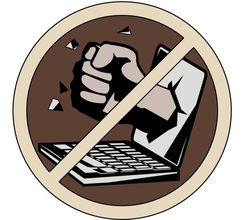
Character education is one method that deserves attention. According to Alberta Education (2013) character education is defined as "a deliberate effort to encourage ethical behaviours and personal qualities that our society values, such as respect, responsibility, fairness, empathy and self-discipline" (Alberta Edcuation, 2013, "Overview"). This definition can be directly applied to the online world as well, and has just as much, or even more, significance for students. As teachers I believe it is highly important to help develop our students as people, as well as learners. Dates, historical figures, formulas, scientific principles, short stories and equations are often forgotten by students after they have left school, but their character is something that will always be a part of them. Therefore, I believe it is vital for teachers to not only model behaviors expected by students, but also to promote a high level of character education.
The Josephson Institute of Ethics (2013) outlines six pillars of education, which include:
- Trustworthiness
- Respect
- Responsibility
- Fairness
- Caring
- Citizenship
I think these six areas serve as a solid framework for promoting the ideals of character education. Although they are somewhat open-ended, there are many ways to demonstrate and promote these pillars within the classroom.
With respect to cell-phone use in the classroom, I think if teachers use them, students should be allowed to as well. However, it is contingent on when and how it is being used. Similarly, checking personal email or surfing web pages should be done during personal, and not class time. I think if teachers model this kind of behavior for their students, they will serve as examples about how to use technology appropriately within the classroom. The next topic for discussion focuses more on school or division-wide policy rather than classroom specific actions.
Web filters are often used to control the type of web pages users can and cannot visit. However, this policy has raised a host of issues and has people agreeing with, or disagreeing with, its use. Personally, I find web filters an ineffective way to control the content users will view at school. Watters (2011) points out that too much filtering can cause problems for both students and teachers, because it blocks them from retrieving educational content from websites that a filter may deem inappropriate. In addition, many crafty students find ways around the filters and get to the content they want to see anyways. Once they figure out how to maneuver around the filter they can tell others, and then the entire aim of the filter is compromised.
As an alternative, I would recommend that schools or divisions set up a type of digital citizenship passport. If students are caught viewing sites they shouldn't be on, or involved in inappropriate activity, then they will lose some of their privileges. However, if they use the Internet for things they are supposed to be doing then nothing will be filtered for them. However, there are also potential risks associated with this method as well, such as students sharing their log-ins with each other. Nevertheless, it may deter some students from viewing content they shouldn't be and enhance the browsing experience for those who use the Internet responsibly.
Ultimately, it is up to students themselves to decide their level of web awareness. Teachers can educate students as much as possible, but it up to students themselves to use this information to their benefit. However, it is a topic that will continue to be important as long as the pervasiveness of the Internet continues to influence education circles.
References
Fig. 1. No-to-Cyberbullying.jpg. Retrieved on July 19, 2013. From http://socialmediachimps.com/wp-content/uploads/2012/04/No-to-Cyberbullying.jpg
Alberta Education. (2013). The Heart of the Matter: Character and Citizenship Education in Alberta Schools. "Overview." Retrieved from http://www.education.gov.ab.ca/charactered/overview.asp
Be Web Aware. (2013). "Cyberbully." Retrieved from http://www.bewebaware.ca/english/cyberbullying.html
The Josephson Institute of Ethics. (2013). "Six Pillars of Character." Retrieved from http://josephsoninstitute.org/sixpillars.html
Watters, Audrey. (2001, October 10). "Can Google Challenge Over-Zealous Web Filtering at Schools?" Retrieved from http://hackeducation.com/2011/10/10/can-google-help-challenge-over-zealous-web-filtering-at-schools/
Significant Comments:
http://jillianmacdonald.wordpress.com/2013/07/21/topic-8-web-awareness-i/#respond
http://jenseducationportfolio.weebly.com/3/post/2013/07/topic-8-web-awareness-i.html#comments
 RSS Feed
RSS Feed